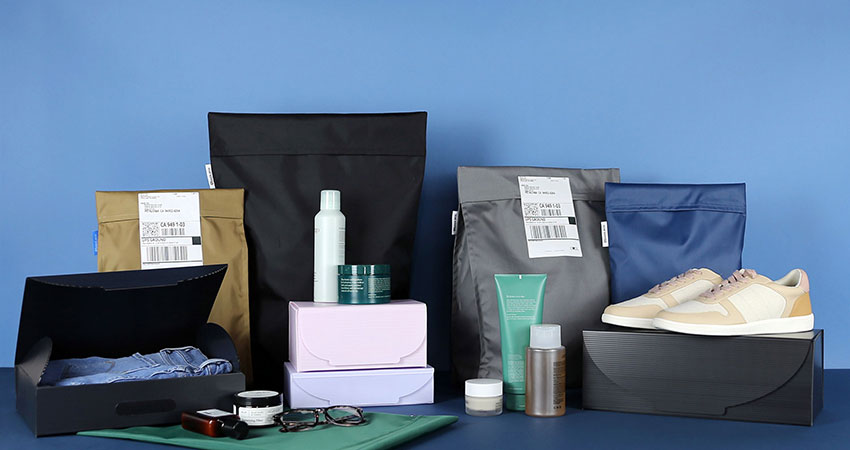Boox, a company providing returns service with reusable boxes being trialed by companies like Sephora, Revolve and lululemon, is rolling out a line of reusable bags as it expands into apparel and other categories and looks to grow its footprint beyond the U.S. and the UK.
The Boox Baag, as it’s called, is made from recycled polyester, but the company is exploring a wide variety of other fabric materials to find the right balance of sustainability, durability and cost. The patented boxes and bags were designed to be recovered and reused hundreds of times. Boox uses manufacturing partners in the U.S. and the UK, with plans to expand into Canada and the EU, respectively.
Founded in 2019, Boox has raised a total of $11.25 million in seed and Series A rounds led by Wave Capital and Valor Siren Ventures, respectively, and was named one of Time magazine’s best inventions of 2021. The company is projecting 10x growth in 2022, on pace to eclipse more than 1 million boxes shipped while hitting $10 million in recurring revenue.
Shoppers are directed by QR code where to drop off the boxes and bags at one of 6,000+ Happy Returns bar in the U.S., and at an InPost smart locker in the UK, currently with about 4,000 units. Retailers pay on a monthly or quarterly basis based on the volume of boxes or bags delivered to their fulfillment centers. Larger companies provide annual projections based on historical data.
The company has 16 different box sizes, made from corrugated polypropylene, up to one that’s roughly 2x the size of a shoebox. The boxes have proven especially popular with skincare companies than can custom brand them, with a dozen among the client base. There are three different SKUs of bag at launch, with apparel a natural target area mostly served today by poly mailers.
Boox CEO and Co-Founder Matt Semmelhack said the company was founded out of his previous experience with Thistle, a San Franciso-area food delivery startup. Semmelhack said customers loved the service but hated the packaging waste. When he approached the founders with the idea of developing reusable packaging internally, they encouraged him to launch a separate company.
Boox boxes are premium priced, but the cost has been brought down to within 5%-10% of comparable corrugated products, he said. Boox has been able to achieve economies of scale with larger clients, saving on manufacturing costs, full truckload shipping and annual volume commitments, making it more affordable for smaller companies as prices were reduced last quarter.
Pricing includes use of a Boox for each shipment plus the reverse logistics to get it back to an operations hub at its headquarters in Petaluma, CA, or one in the UK. By opening up more facilities to save on logistics costs, the goal is to get prices below $1 per item across most of its SKUs, making it extremely price competitive with cardboard.
“We got big enough that rates for manufacturing and storage decreased,” Semmelhack said. “When we reach a moment where it’s as affordable or even less expensive, that will be an inflection moment. It won’t just be for premium brands, but anyone that ships anything can switch over.”
With the bags, Semmelhack said it will take a while for the price to be comparable to single-use poly mailers. “That said, the marketing value of switching is a pretty clear positive ROI for our clients to differentiate their brands. We know from several examples that clients are finding Boox pays for itself very quickly in terms of customer retention. It’s no secret that younger consumers are choosing consumer brands based on their sustainability ethos.”
Boox plans to own some of its own manufacturing sometime in 2023 and vertically integrate its supply chain, once its volume justifies the capital expense.
“The exciting thing is we plan to design our manufacturing to complete a full closed loop,” Semmelhack said. “We can manufacture Booxes from post-consumer materials, use them dozens of times, recover them, then process them back into the base material and start the process again, all in the same facility. A truly circular economy.”
Plans also call for Boox to launch a separate recommerce operation later this year, now in beta, where consumers would be encouraged to return other items that still have value, including apparel, shoes and electronics.

